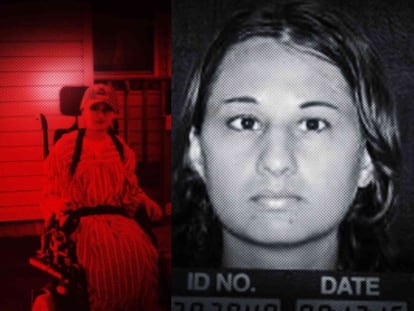A murderer with 6.5 million followers: The Gypsy Rose Blanchard case
A newly released documentary joins the several products trying to capitalize on the curiosity surrounding the young woman who became a celebrity after being imprisoned for the murder of her mother

“First selfie of freedom!” The message written by Gypsy Rose Blanchard on December 28 on her Instagram account has already garnered more than 6.5 million likes. And when she says “freedom,” she means it literally: that was her first selfie after leaving a women’s prison in Missouri where she was held for eight years for the murder of her mother, Dee Dee Blanchard.
If she was already famous, after her release she became a full-fledged celebrity. Her face is all over the tabloids, many television channels want to hear her story and everything she posts on Instagram (where she has more than 6.5 million followers) and TikTok (the same number) gets millions of interactions, mostly related to her image, her accessories, her hairstyle or her manicure; everything is scrutinized as if she were a pop star. There are some who do not join in the enthusiasm: “It makes me very uncomfortable that she is so famous right now for doing something so horrible,” says one of the comments. A few days before leaving prison, she gave a long interview to People magazine, expressing remorse for a crime that she regrets “every single day.” “She didn’t deserve that. She deserved to be where I am, sitting in prison doing time for criminal behavior.”
Her release has caused such a stir that, according to TMZ, the Missouri police was forced to prevent her from attending a Kansas City Chiefs game where she hoped to meet her idol, Taylor Swift, a regular since the start of her relationship with player Travis Kelce. To satisfy the hunger for information, Lifetime premiered The Prison Confessions of Gypsy Rose Blanchard, a six-part documentary with new revelations about the case, which acquired worldwide notoriety thanks to a previous documentary, Mommy Dead and Dearest.

Who is the monster?
“After a lifetime of silence, I finally get to use my voice to share my story and speak my truth. As a survivor of relentless child abuse, this docuseries chronicles my quest for liberation and journey through self-discovery,” Gypsy says in the trailer. “I am unapologetically myself and unafraid to expose the hidden parts of my life that have never been revealed until now.”
On June 14, 2015, police officers from Greene County, Missouri, went to Dee Dee Blanchard’s house after being alerted by neighbors, who were worried after seeing a strange Facebook post. “That Bitch is dead!” could be read in an account usually filled with positivity and focused on her daughter Gypsy, a sick girl who was the center of her life. Not being able to contact her, they feared that something could have happened to them.
When the police entered the house they found the body of Dee Dee, who had been stabbed repeatedly, but no sign of her daughter, only her wheelchair. All the alarms went off. They feared a kidnapping. The girl was well-known in the area; she was a regular at charity events. She suffered from leukemia, heart problems and muscular dystrophy.
The kidnapping theory was ruled out when the police traced the IP of Dee Dee’s Facebook posts to a house in Wisconsin. There they found Gypsy and Nicholas Godejohn, with whom it was discovered that she had a secret romantic relationship. They arrested them both. The most surprising part of the whole chain of atrocities was that Gypsy was actually able to walk by herself; she no longer seemed like the fragile girl who used to be seen on social media surrounded by Disney princesses. According to the initial investigation, the crime had been planned by Gypsy and executed by Godejohn, whom she had met through a Christian dating network.
Gypsy was not the little girl her neighbors thought she was. She was a 25-year-old woman whose mother had falsified her birth certificate. She was not sick, either: it was Dee Dee who made her sick. She never had leukemia, but Dee Dee shaved her head to make it look like she did. She also subjected her to a series of complex, unnecessary surgeries, in her efforts to make her completely dependent. How could something like this have happened? The question still resonates. Dee Dee had kept her daughter away from society, and also from her father, who contributed to her support but who was rarely allowed near her.
What could drive a mother to subject her own daughter to continued suffering? Dee Dee suffered from a factitious disorder, which the Mayo Clinic defines as “a serious mental disorder in which someone deceives others by appearing sick, by purposely getting sick or by self-injury,” a condition commonly known as Munchausen Syndrome. When, as in Dee Dee’s case, the patients make other people sick instead of themselves, it is called Munchausen by proxy, and the victims are usually children, vulnerable adults or even domestic animals. Every time some piece of information came to light during the investigation, the question was the same: who is the monster here?
Gypsy was an accessory to murder, that much was clear. She left the door open so that her boyfriend could enter the house on the night of the crime and she wrote the words on her mother’s Facebook account. For months, both had exchanged messages that came to light during the trial; they went from highly sexual conversations to questions about duct tape and knives. The law was going to be merciless, but society had doubts regarding her guilt.

A perfect mother
Nick Godejohn was sentenced to life in prison for first-degree murder. Gypsy was sentenced to 10 years, the minimum possible. Thanks to a plea deal that acknowledged her abusive relationship with her mother, she served eight. The case had all the ingredients to arouse the public’s fascination, and the media capitalized on it. Two documentaries were released: the aforementioned Mommy Dead and Dearest and Gypsy’s Revenge. In 2019, Hulu produced The Act with Joey King and Patricia Arquette, who received an Emmy for Best Supporting Actress. It was also one of the “heinous crimes” featured in Law & Order: Special Victims Unit, and it appears, thinly disguised, in Ryan Murphy’s The Politician, where Jessica Lange acts as a southern version of Dee Dee. Munchausen syndrome has always captivated fiction.
With each answer came another question. How had Dee Dee been able to deceive doctors and nurses for years? Although fiction shows them as deranged monsters, those affected by factitious disorder tend to be articulate, stable people who spend years learning to avoid the control of the system, and when they feel threatened they change healthcare providers. The reward for so much effort is recognition, feeling indispensable, making something as normal as taking care of children appear heroic. That is one of the reasons why these patients, generally white middle-class women, are so attractive for fiction. What could be more terrifying than a perfectly normal mother who continually harms her daughter?
There is another protagonist in this mother-daughter story: Godejohn. He and Gypsy talked for two years before meeting in person. For their first date they went to see a movie; for their second, he traveled from Wisconsin to Missouri to kill Dee Dee. In Mommy Dead and Dearest Gypsy stated that on the night of the murder she and her mother had gotten a manicure; then, when Dee Dee fell asleep, Godejohn entered the house and stabbed her while Gypsy remained hidden in the bathroom. During the trial Gypsy confessed to convincing him, but despite his lawyers alleging manipulation, he was sentenced to life in prison without the possibility of parole.

The end of the romance
“I was blindly in love,” he declared during the trial. In a later interview he said that the time he spent with Gypsy had been the best of his life. “From the very beginning, I just knew we were soulmates,” he confessed. “Those five days when I was actually with her, physically with her, those five days were the most intense, and magical, and awe-inspiring days I’ve ever had.” He also declared that he had murdered Dee Dee because they could never be together as long as she was alive.
It emerged that Gypsy and Nicholas broke up after she announced her engagement to another man. In 2020, Ryan Scott Anderson, a high school teacher from Louisiana, one of the men with whom she exchanged letters while she served her sentence, came into her life. They got married in prison in July 2022, in a small ceremony with no guests, and now they are planning a big party with all their friends. “We deserve it,” she told People exclusively. She also revealed that she felt some concern because she had never lived with a man: only her mother and her fellow prisoners have been in her life.
Their relationship seems to be going well, judging by a controversial comment she wrote in response to an Instagram post by her husband, in which she boasted about the intensity of their sex life. “Ryan, don’t listen to the haters. I love you, and you love me. We do not owe anyone anything. Our family is who matters. If you get likes and good comments great, if you get hate then whatever because THEY DON’T MATTER. I love you. Besides they [are] jealous because you are rocking my world every night… yeah I said it, the D is fire. Happy wife happy life,” she wrote. To that, her husband replied: “Who said I gave a damn about what these jealous people say anyway, haha... now come get it Baby…”
Gypsy’s life after her release is hectic, and at the same time unusually conventional. The holidays were not too different from anyone else’s, except for the fact that her face is everywhere when she turns on the television. She is a 32-year-old woman who makes TikTok videos and shares photos on Instagram with family and friends celebrating her return home, as if instead of a state prison she had been touring the Greek islands on a cruise ship.
Other criminals seek anonymity after serving their sentence, but this is not her case. There are those who warn of the danger this can pose for a person who has spent her entire life captive and guarded, first by her mother and then by the state. The stories of the celebrities she seems to be trying to emulate are filled with tragic lives and broken toys. “Let’s not turn Gypsy Rose Blanchard into a meme,” wrote Lois Shearing in Cosmopolitan. Judging by the speed with which each anecdote of her new life is going viral, perhaps the warning has come too late.
Sign up for our weekly newsletter to get more English-language news coverage from EL PAÍS USA Edition
Tu suscripción se está usando en otro dispositivo
¿Quieres añadir otro usuario a tu suscripción?
Si continúas leyendo en este dispositivo, no se podrá leer en el otro.
FlechaTu suscripción se está usando en otro dispositivo y solo puedes acceder a EL PAÍS desde un dispositivo a la vez.
Si quieres compartir tu cuenta, cambia tu suscripción a la modalidad Premium, así podrás añadir otro usuario. Cada uno accederá con su propia cuenta de email, lo que os permitirá personalizar vuestra experiencia en EL PAÍS.
¿Tienes una suscripción de empresa? Accede aquí para contratar más cuentas.
En el caso de no saber quién está usando tu cuenta, te recomendamos cambiar tu contraseña aquí.
Si decides continuar compartiendo tu cuenta, este mensaje se mostrará en tu dispositivo y en el de la otra persona que está usando tu cuenta de forma indefinida, afectando a tu experiencia de lectura. Puedes consultar aquí los términos y condiciones de la suscripción digital.









































